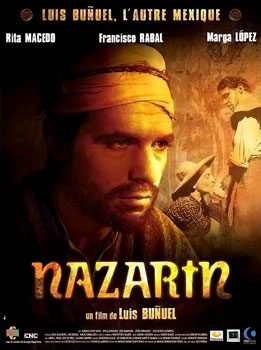Nazarin
(Luis Bunuel, 1959)
Nazarin is a priest,
attempting to living a pure and honest life strictly according to Christian
principles - but others only show him distrust and hatred, apart from the local
prostitute...
Of Luis
Bunuel’s Mexican period many major films have earned their recognition with Film
History. Nazarin is without a doubt
one of them. Winning the 1959 International prize at the Cannes festival this
story of a defrocked priest trying to help and preach in a world of poverty,
sickness, and injustice. As Jeffrey
M. Anderson mentioned in his short and sweet review Bunuel’s Nazarin is very down to earth and his
far from his surrealist cinematic approach. Anderson also highlights with his
great knowledge of John Ford’s films, that Nazarin
feels like Ford’s The Fugitive and
was shot by the same cinematographer Gabriel
Figueroa. The later’s camera work is subtle, natural, dusty, highly filled
with sumptuous camera movements that captures the arid exteriors and darkens
the interiors.
Religion is a
central theme in Bunuel’s filmography and his treatment has often criticized by
subversive manner the subject and how sometimes messianic figures can be
psychotic, illogic, and contrary to moral or common sense. His moral often
permitted to his storytelling abilities to punch in the face of his subject
without getting too much blame.
With Nazarin, Bunuel wants to pass a message
that even the most good willed fellow can fail to help their peers. Every scene
ends with Nazarin letting the people in a worse position that they were before
he got there. He leaves the hotel and the prostitute he was helping put fire in
his room and burned down the whole place, then the workers get into a fight
after he left the field, and on and on. He doesn’t solve a problem and, in fact,
he tries but never succeeds. This is subtle for Bunuel but it is like as if
Bunuel has decided that humanity has failed religion and not the other way
around.
Nazarin is a deep film filled with deep
meanings and is one of the best from Luis Bunuel’s Mexican era along with his
masterpiece Los Olvidados. The fans
of the director are split in two groups; the lovers of the Mexican period and
the lovers of the French surrealist era. I would be more inclined to rewatch
his later films that are in the second group but the whole body of Bunuel’s
work is way richer with his early Spanish films, his Mexican ones, and his
comedic surrealist French films. Nazarin
is a must see but way more sober than The
Discreet Charm of the Bourgeoisie.


No comments:
Post a Comment